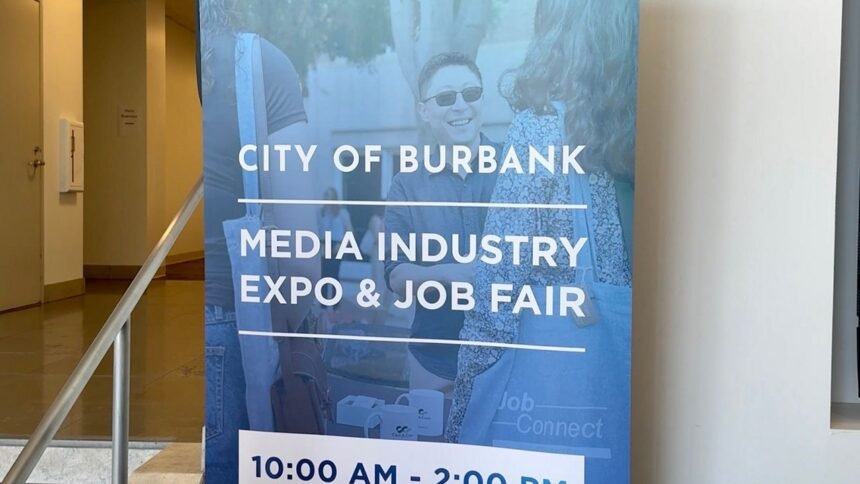BURBANK, Calif. — Woodbury University was alive with motion by 11 a.m.
Booths and branded tents stretched across the open-air courtyard, each one circled by job seekers dressed in business casual, resumes in hand, as the Southern California day heated up. Inside the business school, packed classrooms and conference rooms hosted panelists as they fielded questions from overflow crowds.
The crowd gathered for the Burbank Media Industry Expo and Job Fair, many hoping to find clarity, connections, or, at the very least, a sign that Hollywood is starting to recover.
The industry is still reeling from historic strikes and ongoing slowdowns.
“It’s definitely been difficult to find consistent jobs, or find well-paying jobs because I’m a little newer to the industry,” said Leatha, a writer, director, and script supervisor.
She’s among a wave of creatives leaning into alternative formats, such as vertical shorts — bite-sized, mobile-first videos designed for platforms like TikTok, Instagram Reels, and YouTube Shorts.
Leatha’s been working as a script supervisor on these projects but is open to traditional film and TV opportunities.
The expo, she said, was actually a bright spot.
“I think with this and the panel that we actually just went to was one of the first times that it wasn’t just people saying, “oh, the industry sucks and everything’s hard, so good luck,” she said. “It was more uplifting in the way of yes, the industry is difficult right now, but there is a light at the end of the tunnel,” she said.
But that light isn’t guaranteed just yet. The latest report from FilmLA revealed a 6.2% dip in on-location filming between April and June of this year, compared to the same stretch in 2020. A bright spot: television production is up 17%, signaling that some corners of the industry may be starting to rebound.
Assemblymember and former Burbank mayor Nick Schultz, who helped envision the event’s inaugural staging last year, said part of the goal was to make those opportunities more visible.
“There are over 1,000 entertainment production companies that call our district home, and by extension, they employ thousands of Angelenos and thousands of Californians who are part of this industry, who depend on this industry for their livelihood,” Schultz said.
He pointed to California’s state-level tax incentives and permit programs as a start, but said more work is needed on the local level to compete with other production hubs.
“My ask, my encouragement of all of our local elected leaders — so Burbank City Council, Glendale City Council, Los Angeles City Council – view what the state has done as a foundation, a floor, if you will,” he said. “I think the name of the game to keep more production here in Los Angeles and in California is to look at how we can cut the red tape, speed up approval times and make it easier to produce content here in Los Angeles.”
That urgency was echoed by many on the ground from mid-career cinematographers to newly minted PAs. They want the work to come back.
“We are not going to let this iconic industry that is the backbone of our local economy leave. We are not going to allow that to happen,” Schultz said. “Hollywood production is here to stay. It will have brighter days ahead, and I want them to feel that inspiration.”
Leatha does.
“I know there are people within the Californian government, people who are actively trying to bring more film back to LA, to kind of make this the center for film again,” she said. “I think no matter why, it will make its way back because this is, you know, it’s Hollywood.”
And judging by the sheer turnout, the chatter in the courtyard, the packed conference rooms, and the steady exchange of cards and flyers — it’s clear: the workforce is ready when it does.











